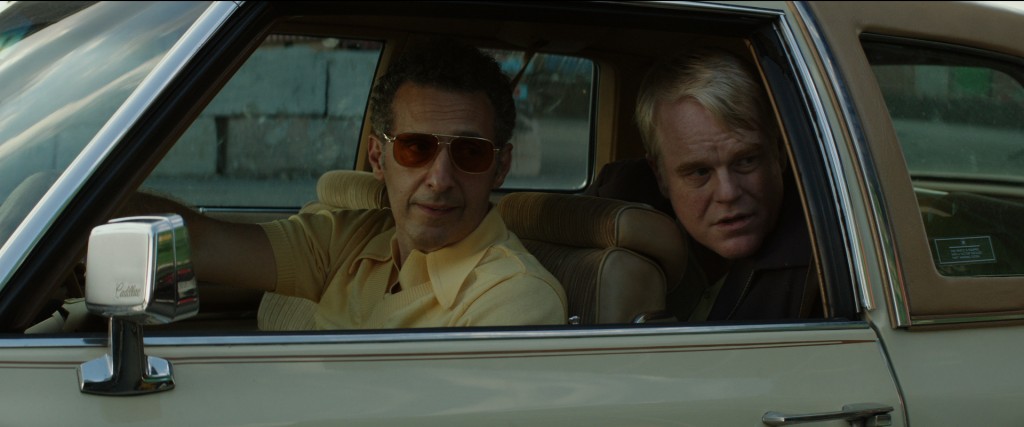It’s fitting, perhaps, that, as far as I can tell, there is no such neighborhood as God’s Pocket. It’s a literary device. I read that the novel upon which John Slattery’s directorial debut is based sets its action in Philadelphia, where its writer, Pete Dexter, made his living as a columnist. The film makes no such allusions. It is every miserablist working-class, undereducated, easily-roused neighborhood-as-allegory you’ve ever seen on film, from Dead End to Out of the Furnace. Like the characters who populate it, the film has no identity, only traits.
We’re told in an opening voiceover that everyone in God’s Pocket has some history of violence or debauchery, but that pretty quickly becomes redundant information. God’s Pocket is an unfocused blend of comedy and tragedy that has few laughs and little to invest emotionally invest in. It has the storyline of an especially dark comedy, but quickly becomes too wrapped up in the grimness of its surroundings to be all that funny, yet is too absurd to be taken seriously. The whole thing reminds me of a line The Joker once said – “It’d be funny if it weren’t so pathetic.”
Mickey Scarpato (Philip Seymour Hoffman), we’re told, is not from the neighborhood, yet he seems the natural byproduct of it. A small-time crook, we meet him, following a brief flash-forward, pitifully screwing his wife, Jeannie (Christina Hendricks) and no sooner finished than out the door to steal a truck full of meat. Along the way, he drops off his son-in-law, Leon (Caleb Landry Jones), for his day-laborer job, during the course of which he’ll shoot off his mouth one too many times, and leave only with a sheet over his face. Most are content to accept the story that it was a run-of-the-mill accident, but Jeannie suspects foul play. Mothers always know, even if their suspicions are unfounded and unmotivated.
I cannot possibly emphasize enough how little that suspicion drives this film. What does drive it is Mickey’s real inability to participate, emotionally, in the world in which he’s so wrapped up. He owes money to everybody, but keeps his affairs managed just tightly enough that he’ll never hit too rocky a road. Leon’s funeral is just another pothole, a continuing series of monetary complications and negotiations that he will manage with the lowest level of competence in an effort to keep his gorgeous wife from falling entirely to pieces. The smallness of Hoffman’s eyes against his frame are his greatest asset here, keeping his fear buried under his imposing exterior.
But what does Mickey really have to fear? Every brush with complete collapse is quickly squared away by a party more generous than himself. Besides the particular nature of his mishaps (which includes carting around Leon’s corpse in his freezer truck), the film’s arch removal from any genuine sense of mortality or danger would be funny, if only Slattery could tell a joke. For an actor with such a sharp wit, trained as a director on the show that made him famous (Mad Men, that is, on which he plays Roger Sterling), his directorial debut is lacking all of that program’s ability to not only manage comedy alongside tragedy in complementary proportions, but even to tell a joke at all.
A few lines really land (Eddie Marsan, as the neighborhood’s slimeball mortician, makes good use of little time), but whole scenes proceed in direct opposition to what their content clearly demands, utilizing too many grim close-ups to observe how spectacularly absurd it all is from a wide shot. Slattery, who cowrote the adaptation with Alex Metcalf, can offer us neither characters worth emotionally investing in nor the quick-wittedness to sustain a laugh. The result is not a bold collision of genres but a mishmash of thoughts and feelings, none formed enough to overtake any other.
Even performances clash – John Turturro is as broad here as in the Transformers series, while Hendricks barely bothered to build a character, letting her grieving-mother role account for any such trifles. Slattery’s ambitions are considerable, his taste exquisite, and his casting department seemingly overflowing with talent (I haven’t even mentioned Richard Jenkins’s alcoholic columnist whose fate bears an eerie resemblance to Dexter’s). But these alone do not craft a film, and Slattery simply lacks the directorial authority to make that final leap. I hope one day it will be viewed as an early stumbling block.





















One thought on “John Slattery Gets Lost in “God’s Pocket””
Disappointed to see most of the reviews for God’s Pocket are saying this is a C-level effort at best. Slattery has shown a knack for directing on the episodes he’s done for Mad Men.